AS SA grapples with arguably its deepest economic crisis of the democratic era, two names have become a magnet for anger over the direction the country is taking.
One is President Jacob Zuma, whose seven years in office have been characterised by scandals against a backdrop of tepid growth and mounting concerns about corruption and cronyism. The other name is Gupta, a family with close ties to Zuma, who run a multibillion-rand business empire.
To detractors, theirs is a relationship that has seen the Guptas, who are originally from India, hold undue sway over government decisions, amid allegations that their political connections have allowed their business to profit from favouritism in state-related contracts. The claim is that under Zuma’s watch, predatory networks of patronage and cronyism are effectively looting the state, with the phrase "state capture" now part of the lexicon. As scrutiny on their interests and role mounts, the Guptas are increasingly portrayed as a symbol of the malaise afflicting SA.
They have been accused of wielding influence over state officials and appointments, and using their connections to win state contracts, none of which is proven.
"(The Guptas’) businesses are quite opaque and difficult to pin down," says David Lewis, head of Corruption Watch, a civil society group. "But (their) sole competitive advantage seems to be their closeness to important political leaders … notably President Zuma and his family."
Zuma and Ajay Gupta defend their relationship, denying that the family has any influence over politics nor that it has benefited unduly from their relations.
"We are business people and we have nothing to do with politics," Gupta says.
The eldest of three brothers who run the family’s empire, he says only 1% of the more than R5bn annual revenue generated from their businesses is derived from government contracts. "It’s rubbish, completely rubbish," he says, in response to questions about whether his family has influenced ministerial appointments. "These are all rumours and you cannot give a reply to the rumours."
Since Zuma’s decision in December to replace former finance minister Nhlanhla Nene with a little-known backbencher, Desmond van Rooyen, the scrutiny on the Guptas’ role has intensified.
...
THE debacle triggered one of the deepest political and economic crises in two decades, and speculation that Zuma and his allies wanted a more pliable hand managing the state’s purse strings.
Nene is said to have resisted Zuma’s plans for the government to build nuclear plants that many believe the country cannot afford, as well as attempts by the board of South African Airways, to renegotiate a deal with Airbus.
A former senior state official confirmed that in 2011, SA’s three chiefs of intelligence agreed that the family should be investigated, as reports of their influence surfaced. But the state security ministry quashed the idea within 24 hours, the person says. "If there’s state capture, it goes to the heart of national security," the former official says. All three intelligence chiefs later resigned.
Their fears seemed to be borne out when a chartered aircraft carrying passengers from India to a Gupta family wedding landed at Waterkloof Air Force Base in April 2013.
A government inquiry later said the affair was a "national security incident", as the air base is exclusively for the use of military flights and heads of state.
It concluded that the "activities of some of the persons involved were driven by the undesirable practice of undue influence and abuse of higher office".
A meeting of senior African National Congress (ANC) officials in January said the party needed to "deal decisively with the threat of state capture", a phenomenon in which state contracts are divvied up among a cabal of politicians and businessmen.
ANC treasurer-general Zweli Mkhize says the message was not aimed at one group or individual, but rather as a warning to "elected leaders to be conscious not to succumb to any demands from any interest groups. I wouldn’t personalise it on the Guptas; I would say it’s general," he says.
Zuma insists there was no outside influence on his decision to replace Nene with van Rooyen. He defends van Rooyen’s appointment as a "well thought-out decision". He is equally categorical in his defence of his relationship with the Guptas and their involvement with his son Duduzane. "Is there anything wrong if Duduzane as a son of Jacob Zuma, in his own right, joins companies or forms companies with other people? What is the problem?"
The Guptas trace their roots in SA to 1993, when Atul Gupta, one of the three brothers, first visited the country. He decided to return to open a shoe shop in Johannesburg. His brothers, Rajesh and Ajay, followed and, in 1997, the family — which already had business interests in India — established Sahara Computers.
It has since expanded its interests across mining, property, and the media.
Ajay Gupta puts the success down to "hard-working people", but questions remain about where the family got the money to expand its business empire. Its two main holding companies, Sahara Holdings and Oakbay Investments, generated revenue of R1.35bn and R3.6bn, respectively in the 12 months to the end of February last year, the Guptas say.
Duduzane Zuma, once a trainee at Sahara Computers, has direct or indirect holdings in several Gupta-controlled entities. These include Infinity Media, the holding company for TV channel ANN7, and Tegeta Exploration & Resources, a mining company.
"We realised we had a good synergy, and (Duduzane) is a young man; he really worked … so … we said, ‘OK, let’s stick together’," Gupta says.
He adds that the family "maybe" provided the younger Zuma "a very small loan" in the form of vendor financing, as is common in SA when businesses look to bring in black partners to meet targets on black participation in the economy.
Tegeta — which is 34.5%-owned by Oakbay Investments and 28.5% by Duduzane’s Mabengela Investments — has been at the centre of allegations that mining authorities pushed Glencore, the Swiss group, into selling its loss-making Optimum coal mine to the company last year.
A person familiar with the deal says the mining authorities used the threat of regulatory action to pressure Glencore, adding: "It was an interventionist strategy, with a credible threat from the authorities."
The Department of Mineral Resources and Oakbay deny the allegations. The company says it sought, and failed, to buy two other mines. "Despite our perceived influence and power, we got knocked out in the first round in two of those (bids)," says Nazeem Howa, CEO of Oakbay Investments.
The Guptas have enjoyed relations with politicians for many years. In 2002, Ajay Gupta was appointed to the board of trustees of Brand SA, a position he retains.
He dismisses local media reports suggesting he had links to the mining minister or any influence in van Rooyen’s four-day stint as finance minister. "Maybe I saw him at one or two places, but I don’t have any relationship at all," he says.
The family also deny a claim that weeks before van Rooyen’s appointment, they had asked Deputy Finance Minister Mcebisi Jonas if he were interested in the Treasury’s top post at a meeting at the Gupta home.
...
THE Treasury and Jonas decline to comment, neither denying nor confirming the existence of the meeting.
The family first met the president in the early 2000s. One of his daughters was a director at Sahara Computers, and one of his wives worked at the Guptas’ JIC Mining Services.
Last month, Finance Minister Pravin Gordhan chose not to take part in a breakfast with business leaders under the banner of the Guptas’ New Age media group. He warned: "There are many parts of transacting between government and business which have gone seriously wrong and if we don’t stop it, we’re going to become a kleptocracy."
Former president Kgalema Motlanthe says the ANC should put its foot down. "If it (the ANC) is itself in a bad shape, or weak, then there are no checks and balances. That’s how one thing just leads to another and, before you know, it there is a total culture of patronage and corruption," he says.
(c) The Financial Times Limited

From left: Ajay Gupta younger brother Atul Gupta and Oakbay MD Jagdish Parekh and Duduzane Zuma , who is a son of the president. Picture: MARTIN RHODES
AS SA grapples with arguably its deepest economic crisis of the democratic era, two names have become a magnet for anger over the direction the country is taking.
One is President Jacob Zuma, whose seven years in office have been characterised by scandals against a backdrop of tepid growth and mounting concerns about corruption and cronyism. The other name is Gupta, a family with close ties to Zuma, who run a multibillion-rand business empire.
To detractors, theirs is a relationship that has seen the Guptas, who are originally from India, hold undue sway over government decisions, amid allegations that their political connections have allowed their business to profit from favouritism in state-related contracts. The claim is that under Zuma’s watch, predatory networks of patronage and cronyism are effectively looting the state, with the phrase "state capture" now part of the lexicon. As scrutiny on their interests and role mounts, the Guptas are increasingly portrayed as a symbol of the malaise afflicting SA.
They have been accused of wielding influence over state officials and appointments, and using their connections to win state contracts, none of which is proven.
"(The Guptas’) businesses are quite opaque and difficult to pin down," says David Lewis, head of Corruption Watch, a civil society group. "But (their) sole competitive advantage seems to be their closeness to important political leaders … notably President Zuma and his family."
Zuma and Ajay Gupta defend their relationship, denying that the family has any influence over politics nor that it has benefited unduly from their relations.
"We are business people and we have nothing to do with politics," Gupta says.
The eldest of three brothers who run the family’s empire, he says only 1% of the more than R5bn annual revenue generated from their businesses is derived from government contracts. "It’s rubbish, completely rubbish," he says, in response to questions about whether his family has influenced ministerial appointments. "These are all rumours and you cannot give a reply to the rumours."
Since Zuma’s decision in December to replace former finance minister Nhlanhla Nene with a little-known backbencher, Desmond van Rooyen, the scrutiny on the Guptas’ role has intensified.
...
THE debacle triggered one of the deepest political and economic crises in two decades, and speculation that Zuma and his allies wanted a more pliable hand managing the state’s purse strings.
Nene is said to have resisted Zuma’s plans for the government to build nuclear plants that many believe the country cannot afford, as well as attempts by the board of South African Airways, to renegotiate a deal with Airbus.
A former senior state official confirmed that in 2011, SA’s three chiefs of intelligence agreed that the family should be investigated, as reports of their influence surfaced. But the state security ministry quashed the idea within 24 hours, the person says. "If there’s state capture, it goes to the heart of national security," the former official says. All three intelligence chiefs later resigned.
Their fears seemed to be borne out when a chartered aircraft carrying passengers from India to a Gupta family wedding landed at Waterkloof Air Force Base in April 2013.
A government inquiry later said the affair was a "national security incident", as the air base is exclusively for the use of military flights and heads of state.
It concluded that the "activities of some of the persons involved were driven by the undesirable practice of undue influence and abuse of higher office".
A meeting of senior African National Congress (ANC) officials in January said the party needed to "deal decisively with the threat of state capture", a phenomenon in which state contracts are divvied up among a cabal of politicians and businessmen.
ANC treasurer-general Zweli Mkhize says the message was not aimed at one group or individual, but rather as a warning to "elected leaders to be conscious not to succumb to any demands from any interest groups. I wouldn’t personalise it on the Guptas; I would say it’s general," he says.
Zuma insists there was no outside influence on his decision to replace Nene with van Rooyen. He defends van Rooyen’s appointment as a "well thought-out decision". He is equally categorical in his defence of his relationship with the Guptas and their involvement with his son Duduzane. "Is there anything wrong if Duduzane as a son of Jacob Zuma, in his own right, joins companies or forms companies with other people? What is the problem?"
The Guptas trace their roots in SA to 1993, when Atul Gupta, one of the three brothers, first visited the country. He decided to return to open a shoe shop in Johannesburg. His brothers, Rajesh and Ajay, followed and, in 1997, the family — which already had business interests in India — established Sahara Computers.
It has since expanded its interests across mining, property, and the media.
Ajay Gupta puts the success down to "hard-working people", but questions remain about where the family got the money to expand its business empire. Its two main holding companies, Sahara Holdings and Oakbay Investments, generated revenue of R1.35bn and R3.6bn, respectively in the 12 months to the end of February last year, the Guptas say.
Duduzane Zuma, once a trainee at Sahara Computers, has direct or indirect holdings in several Gupta-controlled entities. These include Infinity Media, the holding company for TV channel ANN7, and Tegeta Exploration & Resources, a mining company.
"We realised we had a good synergy, and (Duduzane) is a young man; he really worked … so … we said, ‘OK, let’s stick together’," Gupta says.
He adds that the family "maybe" provided the younger Zuma "a very small loan" in the form of vendor financing, as is common in SA when businesses look to bring in black partners to meet targets on black participation in the economy.
Tegeta — which is 34.5%-owned by Oakbay Investments and 28.5% by Duduzane’s Mabengela Investments — has been at the centre of allegations that mining authorities pushed Glencore, the Swiss group, into selling its loss-making Optimum coal mine to the company last year.
A person familiar with the deal says the mining authorities used the threat of regulatory action to pressure Glencore, adding: "It was an interventionist strategy, with a credible threat from the authorities."
The Department of Mineral Resources and Oakbay deny the allegations. The company says it sought, and failed, to buy two other mines. "Despite our perceived influence and power, we got knocked out in the first round in two of those (bids)," says Nazeem Howa, CEO of Oakbay Investments.
The Guptas have enjoyed relations with politicians for many years. In 2002, Ajay Gupta was appointed to the board of trustees of Brand SA, a position he retains.
He dismisses local media reports suggesting he had links to the mining minister or any influence in van Rooyen’s four-day stint as finance minister. "Maybe I saw him at one or two places, but I don’t have any relationship at all," he says.
The family also deny a claim that weeks before van Rooyen’s appointment, they had asked Deputy Finance Minister Mcebisi Jonas if he were interested in the Treasury’s top post at a meeting at the Gupta home.
...
THE Treasury and Jonas decline to comment, neither denying nor confirming the existence of the meeting.
The family first met the president in the early 2000s. One of his daughters was a director at Sahara Computers, and one of his wives worked at the Guptas’ JIC Mining Services.
Last month, Finance Minister Pravin Gordhan chose not to take part in a breakfast with business leaders under the banner of the Guptas’ New Age media group. He warned: "There are many parts of transacting between government and business which have gone seriously wrong and if we don’t stop it, we’re going to become a kleptocracy."
Former president Kgalema Motlanthe says the ANC should put its foot down. "If it (the ANC) is itself in a bad shape, or weak, then there are no checks and balances. That’s how one thing just leads to another and, before you know, it there is a total culture of patronage and corruption," he says.
(c) The Financial Times Limited


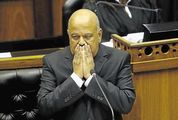
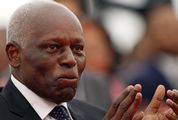

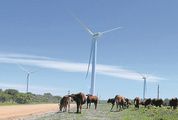


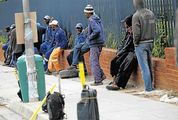
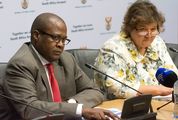














Change: 0.40%
Change: 0.47%
Change: -0.49%
Change: 0.53%
Change: 1.03%
Data supplied by Profile Data
Change: 1.71%
Change: 1.28%
Change: 0.40%
Change: 0.00%
Change: 1.64%
Data supplied by Profile Data
Change: -1.27%
Change: 0.00%
Change: 0.05%
Change: -0.08%
Change: 0.35%
Data supplied by Profile Data
Change: -0.02%
Change: 0.21%
Change: -0.06%
Change: 0.53%
Change: 0.70%
Data supplied by Profile Data